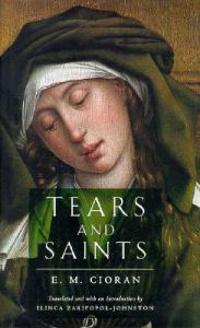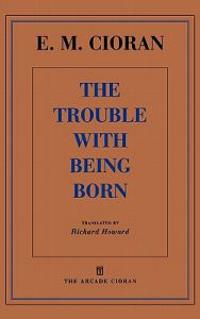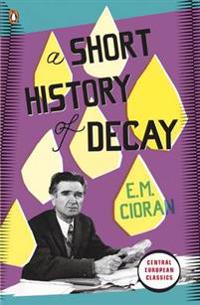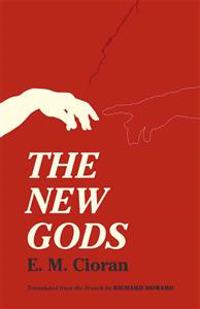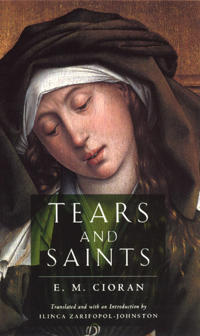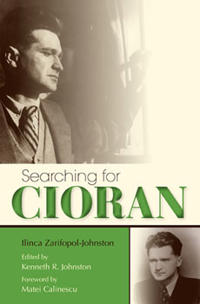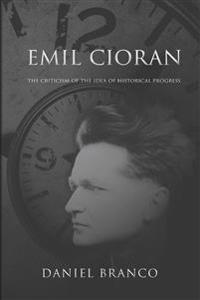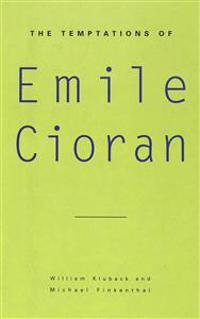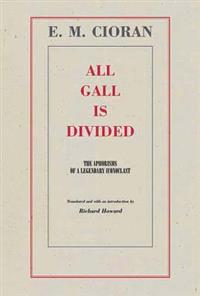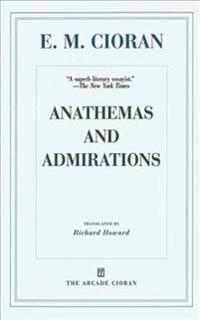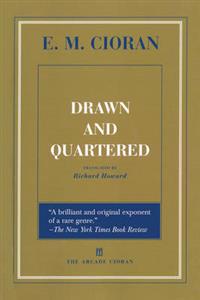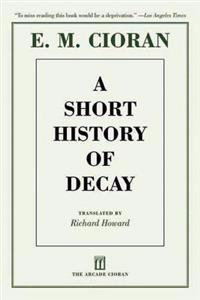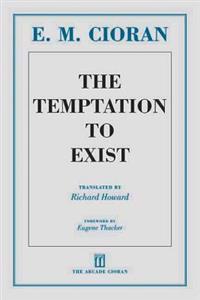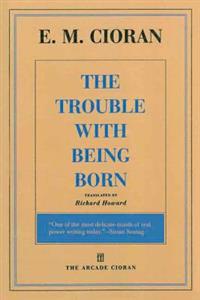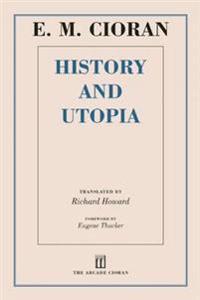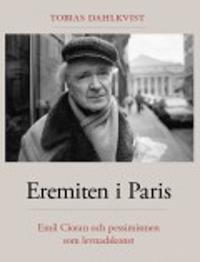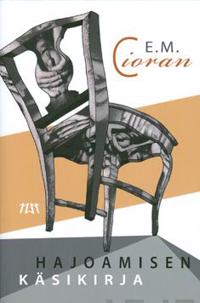Tears and Saints (Inbunden)
avE. M. Cioran, Ilinca (TRN) Zarifopol-Johnston, E. M. Cioran
ISBN: 9780226106724 - UTGIVEN: 1995-12By the mid-1930s, Emil Cioran was already known as a leader of a new generation of politically committed Romanian intellectuals. Researching another, more radical book, Cioran was spending hours in a library poring over the lives of saints. As a modern hagiographer, Cioran "dreamt" himself "the chro[...]
A Short History of Decay (Häftad)
avE.M. Cioran
ISBN: 9780141192727 - UTGIVEN: 201005"A Short History of Decay (1949)" is E. M. Cioran's nihilistic and witty collection of aphoristic essays concerning the nature of civilization in mid-twentieth-century Europe. Touching upon Man's need to worship, the feebleness of God, the downfall of the Ancient Greeks and the melancholy baseness o[...]
The New Gods (Häftad)
avE. M. Cioran
ISBN: 9780226037103 - UTGIVEN: 201303Dubbed "Nietzsche without his hammer" by literary critic James Wood, the Romanian philosopher E. M. Cioran is known as much for his profound pessimism and fatalistic approach as for the lyrical, raging prose with which he communicates them. Unlike many of his other works, such as "On the Heights of [...]
Tears and Saints (Häftad)
avE.M. Cioran, Ilinca Zarifopol-Johnston
ISBN: 9780226106748 - UTGIVEN: 199807Tears and Saints focuses not on martyrs or heroes but on the mystics - primarily female - famous for their keening spirituality and intimate knowledge of God. Their Christianity was anti-theological, anti-institutional, and based on intuition and sentiment. Many, such as Catherine of Siena, Teresa o[...]
Searching for Cioran (Inbunden)
avIlinca Zarifopol-Johnston, Kenneth R. (EDT) Johnston, Matei (FRW) Calinescu
ISBN: 9780253352675 - UTGIVEN: 2008-12Ilinca Zarifopol-Johnston's critical biography of the Romanian-born French philosopher E. M. Cioran focuses on his crucial formative years as a mystical revolutionary attracted to right-wing nationalist politics in interwar Romania, his writings of this period, and his self-imposed exile to France i[...]
The Temptations of Emile Cioran
ISBN: 9780820431048 - UTGIVEN: 1997-04The Romanian-born Emile Cioran is one of the most important figures of modern French philosophy and literature. Even though most of his French works have been translated into English, this is the first attempt to produce a comprehensive presentation and appraisal of his work to an English-speaking p[...]
All Gall Is Divided: The Aphorisms of a Legendary Iconoclast (Inbunden)
avE. M. Cioran
ISBN: 9781611453072 - UTGIVEN: 201205E. M. Cioran lived on the margins of the modern world. Like his friends Beckett and Ionesco, he stood apart from all the official trappings of his chosen medium of philosophy. Not since Nietzsche has a thinker revealed himself so drastically. All Gall Is Divided is a breviary of estrangement that re[...]
Anathemas and Admirations (Häftad)
avE. M. Cioran, Eugene Thacker
ISBN: 9781611456882 - UTGIVEN: 201211In this collection of essays and epigrams, E.M. Cioran gives us portraits and evaluations--which he calls "admirations"--of Samuel Beckett, Jorge Luis Borges, F. Scott Fitzgerald, the poet Paul Valery, and Mircea Eliade, among others. In alternating sections of aphorisms--his "anathemas"--he deliver[...]
Drawn and Quartered (Häftad)
avE. M. Cioran, Eugene Thacker
ISBN: 9781611456967 - UTGIVEN: 201211In this collection of aphorisms and short essays, E.M. Cioran sets about the task of peeling off the layers of false realities with which society masks the truth. For him, real hope lies in this task, and thus, while he perceives the world darkly, he refuses to give in to despair. He hits upon this [...]
A Short History of Decay (Häftad)
avE. M. Cioran, Eugene Thacker
ISBN: 9781611457360 - UTGIVEN: 201211E. M. Cioran confronts the place of today's world in the context of human history--focusing on such major issues of the twentieth century as human progress, fanaticism, and science--in this nihilistic and witty collection of aphoristic essays concerning the nature of civilization in mid-twentieth-ce[...]
The Temptation to Exist (Häftad)
avE. M. Cioran, Eugene Thacker
ISBN: 9781611457384 - UTGIVEN: 201302This collection of eleven essays originally appeared in France thirty years ago and created a literary whirlwind on the Left Bank. Cioran writes incisively about Western civilizations, the writer, the novel, mystics, apostles, and philosophers.The Temptation to Exist first introduced this brilliant [...]
The Trouble with Being Born (Häftad)
avE. M. Cioran, Eugene Thacker
ISBN: 9781611457407 - UTGIVEN: 201302In this volume, which reaffirms the uncompromising brilliance of his mind, Cioran strips the human condition down to its most basic components, birth and death, suggesting that disaster lies not in the prospect of death but in the fact of birth, "that laughable accident." In the lucid, aphoristic st[...]
History and Utopia (Pocket)
avE. M. Cioran, Richard (TRN) Howard, Eugene (FRW) Thacker
ISBN: 9781628724257 - UTGIVEN: 2015-01"Only a monster can allow himself the luxury of seeing things as they are," writes E. M. Cioran, the Romanian-born philosopher who has rightly been compared to Samuel Beckett. In "History and Utopia," Cioran the monster writes of politics in its broadest sense, of history, and of the utopian dream. [...]
Eremiten i Paris : Emil Cioran och pessimismen som levnadskonst (Danskt band)
avTobias Dahlkvist
ISBN: 9789172473249 - UTGIVEN: 201308Den pessimistiska traditionen inom filosofin känner många svartsynta excentriker, många bländande stilister, många svarta humorister. Frågan är om någon förenat detta i sådan grad som den rumänske filosofen Emil Cioran. Född i Rumänien 1911 kom han efter studier i filosofi i Bukarest oc[...]
Sammanfattning av sönderfallet (Häftad)
avEmil Cioran
ISBN: 9789173271691 - UTGIVEN: 2013-02-13När Sammanfattning av sönderfallet publicerades i Frankrike 1949 väckte boken stor uppskattning och belönades med Prix Rivarol för bästa bok på franska av en icke-fransk författare. Under de föregående åren hade rumänen Cioran i sin självvalda exil i Paris fulländat sin franska och ren[...]
Hajoamisen käsikirja (Häftad)
avE.M. Cioran
ISBN: 9789525503388 - UTGIVEN: 2009"Elävistä olennoista vain ihminen herättää jatkuvasti inhoa."Romanialaisranskalainen aforistikko ja esseisti E. M. Cioran (1911-1995) arvioi ihmisen pyrintöjä ja inhimillistä kulttuuria karunnuivasti ja skeptisesti. Hänen käsittelyssään sortuvat ihanteet ja varmuudet, toiveet ja pilvilin[...]

